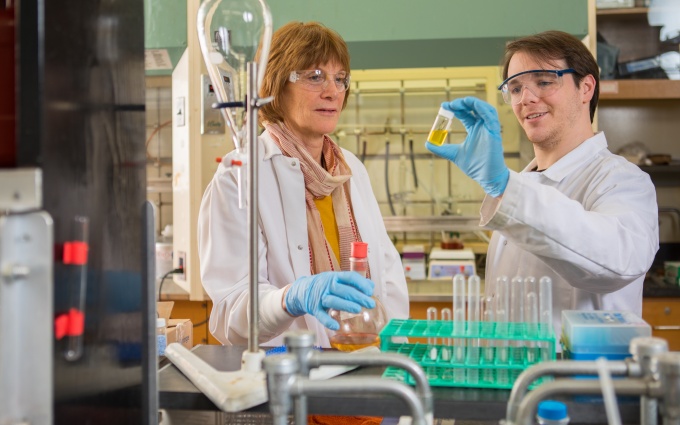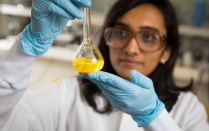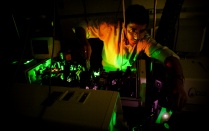PhD in Chemistry

The PhD in Chemistry is primarily a research degree. The majority of a doctoral student’s time will be devoted to original research that nurtures creativity and independent thinking. The department recognizes the importance of this aspect of a graduate student’s development, and has established requirements that provide a stimulating environment to perform first-rate chemical research.
PhD Program Requirements
- Coursework
Once admitted to the PhD in Chemistry program, students are required to complete six graduate-level lecture courses during the first two years of full-time study. Of these courses, three must be one-semester introductory core courses selected from the four traditional areas of chemistry, while the other three elective courses are chosen in consultation with the student’s research advisor. - Proficiency
Students must also demonstrate proficiency in analytical, inorganic, organic and physical chemistry during the first three semesters. Proficiency can be established by completing a core graduate course or by passing the ACS Placement Exam in the area. A 3.00 grade point average in lecture courses is required. - Research Synopsis
During the fifth semester (third year) of graduate study, PhD students are required to prepare a written research synopsis summarizing research progress to date and future research plans. An oral examination with the student’s PhD committee is used to evaluate the student’s research potential. - Research Proposal
Also during the fifth semester, the student is required to write and orally defend an independent research proposal. This proposal involves the identification of a problem from the chemical literature that is not directly related to the student’s thesis work and a proposed solution to that problem. There are no cumulative exams in the UB Department of Chemistry. - Public Lecture
During the fourth year of graduate study, PhD students present a public lecture on their research progress. This provides the PhD committee a chance to give the student feedback prior to finishing their written dissertation. - Dissertation and Oral Defense
The majority of a PhD student’s time is spent on creative research. At the conclusion of the research work, a dissertation must be written and orally defended before the PhD committee and the department at large.
Faculty Research Mentor
The Department of Chemistry views an advanced degree in chemistry or medicinal chemistry as primarily a research degree, so the choice of research director is an important decision for the first-year graduate student. To facilitate the selection of the research mentor, the members of the faculty engaged in research present a general overview of their research interests in a series of meetings with the new graduate students. This allows the students to become acquainted with the different research opportunities in the program in an informal setting.
Students are also encouraged to speak informally with as many faculty members as possible before making their decision. Assistance is available to those students having difficulty with this decision. However, it is to the student’s advantage to select a research advisor at the earliest possible date. Typically, graduate research is initiated during the second semester or during the first summer within the program.
PhD Student Timeline
Upon arrival, all new graduate students are required to take standardized tests produced by the American Chemical Society to assess their preparation for graduate study. Results of these tests are used by the Graduate Curriculum Committee to help students select their first-semester courses. A typical first-semester graduate student takes three core graduate-level courses and is also engaged in TA duties. Most of the required course work is finished by the end of the second or third semester in the program.
The following table provides a typical PhD graduate student timeline:
| Year | Semester | Action |
| First | Fall | Take three core courses Choose research advisor |
| First | Spring | Take three elective courses Start research |
| Second | Fall | Complete coursework |
| Third | Fall | Research Synopsis Research Proposal |
| Fourth | Fall or Spring | Research Seminar |
| Fifth | Fall or Spring | Thesis Defense |
PhD Program Metrics
Email chemgrad@buffalo.edu or contact Prof. Timothy Cook, director of graduate studies, for more information on this program and the admissions process.

